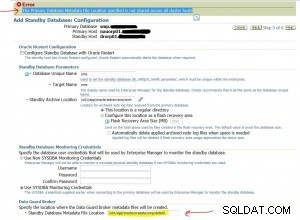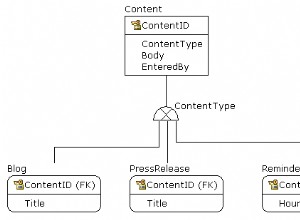Zuerst einige Testdaten:
create table seasons (seasonId int primary key
, "date" datetime not null unique
, tariffId int not null)
insert into seasons values (1, '2009-01-01', 1)
insert into seasons values (2, '2009-01-02', 1)
insert into seasons values (3, '2009-01-03', 2)
insert into seasons values (4, '2009-01-04', 3)
insert into seasons values (5, '2009-01-05', 3)
insert into seasons values (6, '2009-01-06', 1)
insert into seasons values (7, '2009-01-07', 1)
insert into seasons values (8, '2009-01-08', 3)
-- add a tarrif with a datespan larger than 2
insert into seasons values (9, '2009-01-09', 4)
insert into seasons values (10, '2009-01-10', 4)
insert into seasons values (11, '2009-01-11', 4)
Aufbauend auf der Antwort von Dave Barker fügen Sie in den Inline-Ansichten row_number() hinzu, damit wir wissen, welche die ersten Min-Werte sind, welche die zweiten usw. nach TarifId sind. (Da ein Datum nicht mehr als eine TarifId haben kann, müssen wir nicht nach TarifId partitionieren.)
SELECT MinValues.Seasonid, MinValues.Date, MaxValues.Date, MaxValues.tariffid
FROM (
SELECT *, row_number() over (partition by tariffId order by "date") as RN
FROM [dbo].[Seasons] tbl1
WHERE NOT EXISTS (SELECT *
FROM [dbo].[Seasons] tbl2
WHERE tbl1.seasonid - tbl2.seasonid = 1
AND tbl1.tariffId = tbl2.tariffId)) as minValues
JOIN (
SELECT *, row_number() over (partition by tariffId order by "date") as RN
FROM [dbo].[Seasons] tbl1
WHERE NOT EXISTS (SELECT *
FROM [dbo].[Seasons] tbl2
WHERE tbl2.seasonid - tbl1.seasonid = 1
AND tbl1.tariffId = tbl2.tariffId)) as maxValues
ON MinValues.TariffId = MaxValues.tariffId
and MinValues.RN = MaxValues.RN
order by MinValues.Date
Ergebnisse:
1 2009-01-01 00:00:00.000 2009-01-02 00:00:00.000 1
3 2009-01-03 00:00:00.000 2009-01-03 00:00:00.000 2
4 2009-01-04 00:00:00.000 2009-01-05 00:00:00.000 3
6 2009-01-06 00:00:00.000 2009-01-07 00:00:00.000 1
8 2009-01-08 00:00:00.000 2009-01-08 00:00:00.000 3
9 2009-01-09 00:00:00.000 2009-01-11 00:00:00.000 4




